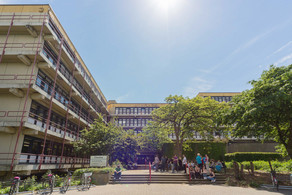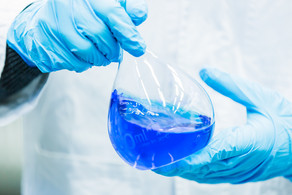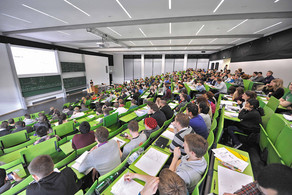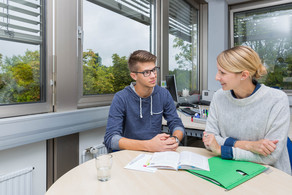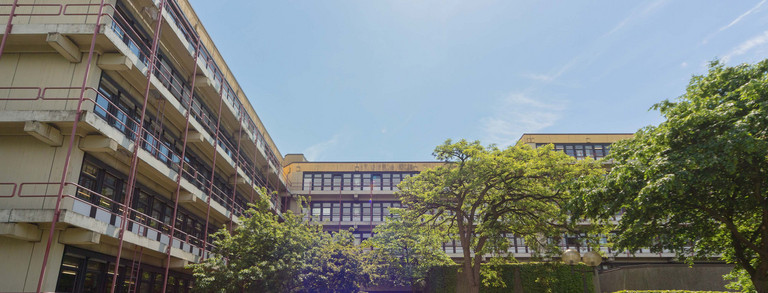Archiv 2021
Ernennung von Prof. Dr. Sebastian Henke
- Neues aus der Fakultät 2021
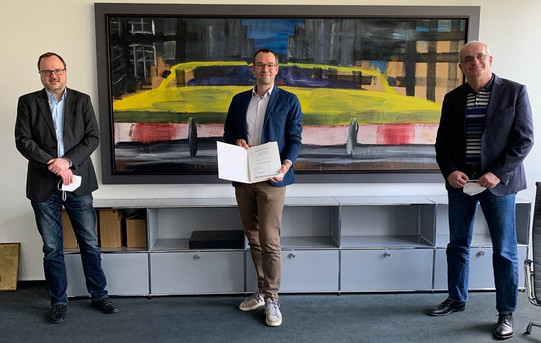
(See below for english translation.)
Nach einer Ausbildung zum Chemisch-Technischen Assistenten studierte Sebastian Henke von 2003 bis 2007 Chemie an der Ruhr-Universität Bochum. Dort promovierte er im Dezember 2011 in der Anorganischen Chemie bei Prof. Roland Fischer mit einer Arbeit über poröse Koordinationsnetzwerke. Im Anschluss wechselte Herr Henke als Postdoc an das Department of Materials Science & Metallurgy der University of Cambridge (UK) in die Arbeitsgruppe von Prof. Sir Anthony Cheetham. Dort erforschte er die Struktur und Dynamik von responsiven Festkörpermaterialien u.a. mittels hochenergetischer Synchrotronstrahlung.
Nach einer Tätigkeit in der Technologieentwicklung eines Elektronikunternehmens wurde Sebastian Henke 2016 als Juniorprofessur für "Materialsynthese und -charakterisierung" an der Fakultät CCB der TU Dortmund berufen. Dort entwickelt er neuartige stimuli-responsive poröse Kristalle und Gläser, welche durch einzigartige adaptive Fähigkeiten neue Möglichkeiten für die Energiespeicherung, Molekülseparation und Sensorik eröffnen sollen. Herr Henke wurde mit diversen Stipendien und Preisen ausgezeichnet, u.a. von den Fonds der Chemischen Industrie und der Alexander von Humboldt-Stiftung. Hervorzuheben ist zudem seine Aktivität im DFG-Schwerpunktprogramm 1928 COORNETs.
Seine materialwissenschaftlich-chemische Forschung etabliert ein neues Forschungsgebiet an der TU Dortmund, welches viele Anknüpfungspunkte an die etablierte Forschung der Fakultät CCB aufweist, sowie weitere Kooperationsmöglichkeiten mit der Physik und den Ingenieurwissenschaften eröffnet. Wir freuen uns, dass Prof. Henke unsere Fakultät dauerhaft in Forschung und Lehre bereichern wird!
Appointment of Prof. Dr. Sebastian Henke
The Faculty CCB welcomes Prof. Dr. Sebastian Henke, who has been appointed to a new professorship in the field of Inorganic Chemistry. Prof. Henke's research in Dortmund includes switchable porous materials.
After training as a chemical-technical assistant, Sebastian Henke studied chemistry at the Ruhr University Bochum from 2003 to 2007. There he completed his doctorate in inorganic chemistry with a thesis on porous coordination networks under Prof. Roland Fischer in December 2011. Subsequently, he joined the Department of Materials Science & Metallurgy at the University of Cambridge (UK) as postdoc in the research group of Prof. Sir Anthony Cheetham. In Cambridge he investigated the structure and dynamics of responsive solid-state materials using high-energy synchrotron radiation.
After working in technology development at an electronics company, Sebastian Henke was appointed Junior Professor for "Materials Synthesis and Characterisation" at the Faculty CCB of TU Dortmund University in 2016. He develops novel stimuli-responsive porous crystals and glasses with unique adaptive capabilities, which open up new possibilities for energy storage, molecule separation and sensor technology. Prof. Henke has been awarded various grants and prizes, including fellowships from the Fonds der Chemischen Industrie and the Alexander von Humboldt Foundation. Furthermore, he is active in the DFG priority programme 1928 COORNETs.
His research in chemical materials science establishes a new field of research at TU Dortmund University, which has many links to the established research of the Faculty CCB, and also opens up further opportunities for cooperation with physics and engineering sciences. We are pleased that Prof. Henke will enrich our faculty in research and teaching!

